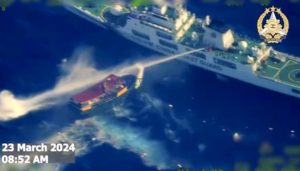Philippine President Ferdinand Marcos Jr. says that his country needs to “do more” than simply protest China’s increasingly forceful actions in the South China Sea, following a tense encounter earlier this month that injured Filipino personnel, one severely.
“We have filed over a hundred protests, we have already made a similar number of demarche,” Marcos told reporters in Manila, according to Reuters. “We have to do more than just that.”
His comments came after an incident on June 17 in which Chinese vessels forcefully blocked a resupply mission to the Philippines’ isolated outpost at Second Thomas Shoal in the Spratly Islands.
During the operation, China Coast Guard personnel on motorboats repeatedly rammed and then boarded two Philippine navy rigid-hulled inflatable boats that were delivering supplies to the BRP Sierra Madre, a warship that Manila grounded on the shoal in 1999. In the ensuing melee, a number of Filipino navy personnel were wounded, including one who reportedly lost his right thumb.
The incident marked the culmination of 18 months of tensions around the shoal, which has now emerged as the primary flashpoint in the South China Sea. The Philippine military likened the action to an “illegal action” and “an act of piracy.” The Department of Foreign Affairs has since lodged a diplomatic protest with China over the clash – one of literally hundreds of formal complaints that the Philippines has issued over the past two years.
Marcos is right that the current approach, fortified by a “name and shame” strategy that has seen Manila publicize China’s growing aggression at Second Thomas Shoal and in other parts of the South China Sea, has been of limited effectiveness. Marcos did not say what he meant by “doing more,” but one obvious option is to call on the Philippines’ security ally, the United States, to play a more active role in the resupply operations around Second Thomas Shoal.
The Philippine leader’s comments came a day after the Biden administration reaffirmed its commitment to Manila’s security in the face of the intensifying Chinese pressure campaign. In a call on Wednesday, U.S. national security adviser Jake Sullivan and his Philippine counterpart, Eduardo Año, “discussed shared concerns over the People’s Republic of China’s dangerous and escalatory actions against the Philippines’ lawful maritime operations near Second Thomas Shoal in the South China Sea,” the White House said in a statement.
Sullivan also repeated the “ironclad U.S. commitment” to come to the aid of the Philippines in the event of any “armed attacks on Philippine armed forces, public vessels, or aircraft – to include those of its Coast Guard – anywhere in the South China Sea.”
This was a reference to Articles IV and V of the Philippines’ Mutual Defense Treaty with the United States, which states that the two nations will come to the other’s aid in the event of “an armed attack on the metropolitan territory of either of the Parties, or on the island territories under its jurisdiction in the Pacific or on its armed forces, public vessels, or aircraft in the Pacific.”
While China has been the primary instigator of the recent tension in the South China Sea – a 2016 arbitral ruling rejected most of Beijing’s claims as legally invalid – the possible engagement of the U.S. could raise the stakes considerably.
As Euan Graham of the Australian Strategic Policy Institute wrote last week, the U.S. is a powerful ally, but the Philippines “must consider the consequences before it escalates.”
“A joint Philippines-US operation to resupply the Sierra Madre would send a firm signal of deterrence and alliance cohesion to China,” he wrote. “But this is ultimately a decision and a request for the Philippines to make.”

































